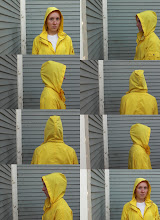In
the beginning of the book Job’s friends are comforting and empathetic towards
Job and his experiences. As any good friend would they go to great lengths to remind Job of
his strengths in an attempt to boon up their peer. The travel from far to comfort him. Well intentions are manifest to begin with, perhaps intentions remain near the end of the text, but hidden in misunderstanding.
As Job moves down a continuum of
suffering, his friends remain static.
Eliphaz, Bildad and Zophar, operate out a colorblind lens, blocking out
a myriad of colors apparent to Job. They understand some things, some
principles, some shades and hues, but are missing the entirety of the
rainbow. Where the three friends
are at in their pursuit of truth is where simply that, a place. Not right or wrong, but simply a place.
A worldview of black and white caters to the idea of retributive justice, the
ideology that attributes reward with righteousness and suffering with sin.
After Job begins to question and
doubt, and to defend his standing as a sinless man despite all of the suffering
that he is experiencing, his friends are shaken and confused, they react impulsively. Their friend Job is experiencing
suffering and pain as a sinless man, this of course is contrary to their own
understanding, Job’s pain is obvious, leaving the only option in the minds of his friends Job must be hiding sin so as to explain his agony.
Job’s suffering rubs off on his
friends to a certain extent, the ripple effect begins to rock the boats of all
three men. They can no longer understand
Job; they can no longer have empathy because Job’s experiences and questions
are beyond their own. Job
is beyond the understanding of his friends as the book continues to paint the
widening gap. Differing worldviews create a friction in the relationship between all involved, Job, his friends, and God. Job creates a new paradigm, one
in which his friends in their rudimentary world do not understand. Job’s new conception is that even good
people suffer, good people have bad things happen to them, and that doesn’t
mean to Job, that God no longer exists. Job juggles with all of the colors he
sees, never denying the existence of God. He may grapple with redefining the characteristics of God.
Loneliness
and frustration are apparent results of Job’s experiences as described in many
chapters, to be noted chapters 9 and 10.
Of course it is! It is only natural that these feelings result when Job
courageously walks, or crawls, further along the continuum alone, he is first,
all of his friends are behind him.
They simply don’t understand him. None of them are able to see beyond
the world of black and white, the world where retributive justice reigns.
In Job’s suffering he is very open,
noble, courageous, honest about his experiences. He refuses to take the road of dishonesty by suppressing his
suffering, dismissing the reality of the awful things that are occurring to
him, skirting them under the rug. He instead voices his pain candidly to an audience that
simply doesn’t understand him. Job is carving a new path as a leader, creating a new way to navigate through
his existential crisis.
Job is perhaps further along, or
more mature in his development, and at this point he is experiencing growing
pains. His understanding is
broadening and provokes questions and doubts. This reaction is courageous and
noble. His honesty is
noteworthy. The friends of Job are
on the same track perhaps, but simply at a different place. They haven’t gone beyond a simpler paradigm
to which a greater avenue of understanding awaits them. Their reaction to Job was according to
their own understanding.
It is sometimes perceived that
Job’s reaction is complaining or murmuring and it has a negative connotation
attached to it. Anger is an
emotion that is labeled as a sin for the culture and people of this time. Still today, I see remnants of this
idea. But is a natural humanistic emotion of anger and frustration a sin? Or is
it a part of the human experience and is justified in Job’s circumstances?

No comments:
Post a Comment